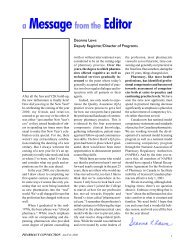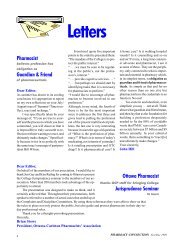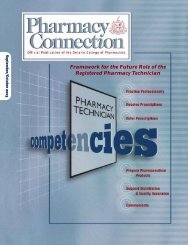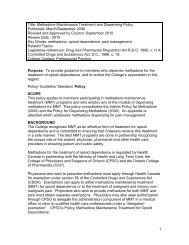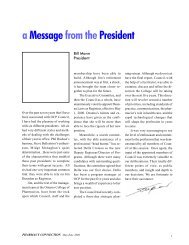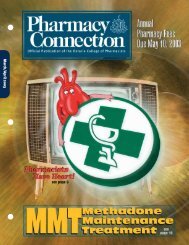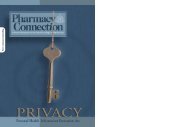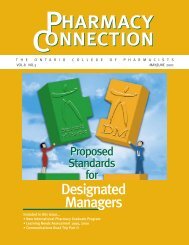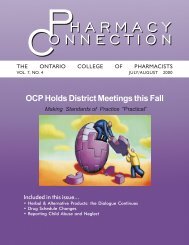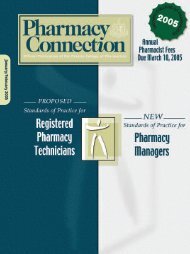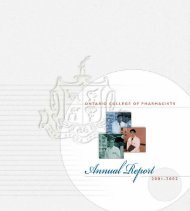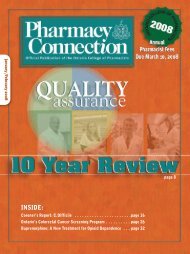July ⢠August 2003 - Ontario College of Pharmacists
July ⢠August 2003 - Ontario College of Pharmacists
July ⢠August 2003 - Ontario College of Pharmacists
You also want an ePaper? Increase the reach of your titles
YUMPU automatically turns print PDFs into web optimized ePapers that Google loves.
Q&A<br />
Q A&<br />
Q A<br />
Stephanie Edwards, B.Sc.Phm.<br />
SPT<br />
Diana Spizzirri, B.Sc.Phm.<br />
QDo pharmacy students need to be<br />
registered with the <strong>College</strong>?<br />
Students must be registered with the <strong>College</strong> to perform<br />
the “controlled acts” (e.g., dialoguing with patients, taking<br />
telephone prescriptions) while under the direct supervision<br />
<strong>of</strong> their preceptor or another pharmacist.<br />
This applies to both international pharmacy graduates<br />
doing SPT Studentship and to Canadian/U.S. students<br />
registered in non-credit studentship positions. (Note: There<br />
is no OCP studentship training requirement for students in<br />
accredited Canadian or U.S. faculties <strong>of</strong> pharmacy, as they<br />
receive experiential training through their existing curricula.)<br />
Furthermore, pharmacy students must identify themselves<br />
as “students” in any situation where they are<br />
performing the controlled acts. All OCP-registered pharmacy<br />
students are assigned an OCP student number and<br />
given an identification card that displays their status.<br />
Interns<br />
Interns must also be registered with the <strong>College</strong> to legally<br />
perform the controlled acts, first under supervision and<br />
then independently, once the preceptor agrees and a pharmacist<br />
remains present in the pharmacy. Preceptors are<br />
reminded that interns must receive notification from the<br />
<strong>College</strong> that their SPT Internship has been successfully<br />
completed. Furthermore, they cannot work alone until they<br />
are licensed.<br />
QIf the student must be supervised while<br />
performing the controlled acts, such as<br />
taking a verbal prescription by phone,<br />
how do you suggest this be done?<br />
This question is frequently raised at the preceptor workshops.<br />
The important thing is for you to give your student as<br />
much practice as possible in listening to, and transcribing,<br />
drug names and directions as well as noting people’s names<br />
over the telephone. You may allow the student to take “live”<br />
verbal prescriptions under direct supervision when you<br />
become comfortable with their ability.<br />
Some creative suggestions for providing students with<br />
opportunities to practice taking telephone prescriptions<br />
include:<br />
• Having a technician or pharmacist read prescriptions<br />
from hard copy files and then have the student review<br />
the written prescriptions to self-assess their accuracy<br />
• Asking a physician’s <strong>of</strong>fice to fax a copy <strong>of</strong> the<br />
prescription so the verbal order can be later verified<br />
• Having a physician assist by giving a verbal order to<br />
the student, and repeat and spell the details as<br />
necessary<br />
• Using a telephone system which allows two people to<br />
listen in on the line, have the student identify<br />
him/herself as a student before taking the prescription,<br />
while the pharmacist listens to verify the order.<br />
continued on page 22<br />
Pharmacy Connection <strong>July</strong> • <strong>August</strong> <strong>2003</strong> 21



